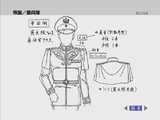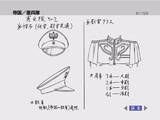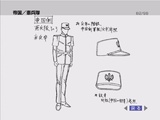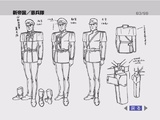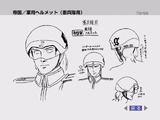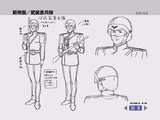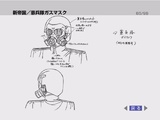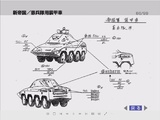Imperial Military Police
From Gineipaedia, the Legend of Galactic Heroes wiki
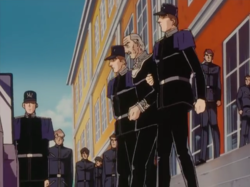
The Imperial Military Police (Japanese: 憲兵隊) was responsible for enforcing the laws and regulations of the Imperial Armed Forces, in contrast to the regular Imperial Police, which had authority over cases that only involved civilians. In practice, the Imperial Military Police functioned as a secret police force.
Contents |
Role
Although they were often known to delve into civilian matters, especially during the Goldenbaum Dynasty, their primary duties were centered around the military and other official government institutions and functions. Because only a few other institutions within the Empire were free of their jurisdiction, the Military Police were an uncheck-able force within the military and were largely left to deal with matters free of interference. The power of this institution gave authority of even middle ranked officers to arrest and, in certain circumstances, strongly advise or even order senior officers as they wish. (DIS: 'Chapter I', DMSN: 'Chapter I')
Being one of the High Nobles' instruments used to assert their control over the Galactic Empire, they were known for brutal tactics and a burning hatred of all republicans and other dissenters that loathed the Kaiser. They were feared by the commoners and those losing power struggles alike as they were waging a never ending campaign against rebellious individuals and dissenters, often torturing to force confessions or at best exiling the suspected if there was a lack of evidence. Execution was the sentence quite often as well, and proof was not considered necessary if there was what was considered to be sufficient circumstantial evidence. If this were the case, it was highly likely that they condemned's family would also be executed as a matter of course. (DMSN: 'Chapter I')
After the Imperial Civil War in which Reinhard von Lohengramm, who himself briefly served with the Military Police when he was a captain, took control of the Empire, Ulrich Kesler, a long time member of the Military Police, was appointed as their Superintendent. Because Reinhard had been assigned with them he was aware of their rampant corruption, and while under his rule all Imperial institutions were reformed, special attention was paid to the Military Police. Under Kesler, they immediately reformed themselves into enforcers of true justice by purging corrupt officials and officers within the Empire while remaining a well structured and disciplined separate entity within the military. They ceased their persecution of republicans and dissenters within the civilian population, although they would still pursue rebellious individuals and groups, the Terraist Church being a prime example of this. They also would stop, in accordance with new laws, the practice of executing a condemned person's family. In the New Galactic Empire, they were a key instrument in helping to end the corruption that had plagued the Goldembaum Dynasty, and were keen and fair enforcers of the Neue Reich's laws. (LOGH: 'Portraits', 'Determination and Ambition', 'To El Facil')
History
In 792 UC (483 IC / 3592 CE), the Military Police investigated Vice Admiral Christoph von Basel for drug trafficking, but he was acquitted after Michael von Keyserling put in a good word for him. (DIS: 'Chapter III')
In April 793 UC (484 IC / 3593 CE), Captain Ulrich Kesler, a former Fleet officer who was transferred to the MPs, oversaw a case in which a grief stricken woman was arrested for damaging a portraits of Kaiser Rudolf the Great and Friedrich IV. Upon hearing of it, Reinhard von Lohengramm was impressed by Kesler's protecting a civilian from unjust treatment by the Military Police, and was enraged when he found out it was ultimately futile, seeing it as further evidence of the Goldenbaum Empire's degeneracy. Lohengramm and his friend Siegfried Kircheis took part in investigating a murder case at the Odin Imperial Officer Academy shortly after that, during their brief time in the Military Police. (DMSN: 'Chapter I', 'Chapter II')
Following the Imperial Civil War of 797 UC (488 IC / 3597 CE), the chief of Military Police, Admiral Oppenheimer was arrested for attempting to bribe Lohengramm, who was the prime minister at the time. Shortly after the defeat in the Eighth Battle of Iserlohn for the Empire, Admiral Anton Hilmer von Schaft, the military's science and technology inspector general, was arrested for corruption, embezzlement of public funds, tax evasion, and betrayal of military secrets by the MPs. Unbeknownst to them, the documents proving his guilt were given to the Imperial ministry of justice by the Dominion of Fezzan. (LOGH: 'Portraits', 'Determination and Ambition')
In the summer of 798 UC (489 IC / 3598 CE), the Military Police noticed the arrival of Count Alfred von Landsberg and Captain Leopold Schumacher, two former Lippstadt League veterans of the civil war, on Odin. However, Lohengramm figured out their plan to abduct the young Kaiser, Erwin Josef II, and allowed it to go ahead for political reasons. The MPs were thus unable to prevent them from successfully kidnapping the emperor and smuggling him to the Free Planets Alliance. Military Police officer Vice Admiral Molt, head of security at Neue Sansouci, committed suicide because of it. (LOGH: 'Thunder', 'The Abduction of the Young Emperor')
During Lohengramm's tenure as Prime Minister of the late Goldenbaum Dynasty, and his reign as kaiser in the New Galactic Empire, the Military Police was led by Admiral Ulrich Kesler, under whom the organization underwent extensive reforms, with many corrupt officers being relieved of duty. The MPs were based at the Gendarmerie Headquarters on Fezzan, the New Imperial Capital. They took part in investigating the Terraist Church following its various terrorist attacks and protected the Imperial family from surviving Terraists. Some military police officers under the command of Fleet Admiral Paul von Oberstein, minister of military affairs, fought briefly with Black Lancers personnel, after Oberstein had their commander, Fritz Josef Bittenfeld, placed under house arrest. (LOGH: 'The Kümmel Incident', 'To El Facil', 'Towards Peace, Through Bloodshed', 'The Burning of Holly House')
Shortly after the conclusion of the Reuenthal Rebellion, some military policemen located and arrested the deranged Count Alfred von Landsberg. (LOGH: 'Running Start Towards the Future')
Uniform and equipment
Military policemen wore the standard Imperial uniforms, including a black tunic and pants. They also wore blue pauldrons on their shoulders to distinguish them from personnel of other branches, as well as small orange tags that read "Der Gendarm" on their chest, for officers, under their left chest plate. Under the Goldenbaum Dynasty, military policemen wore two different variants of caps: one for officers and one for enlisted troops. The one for officers was a peaked cap, while the version worn by lower-ranking military policemen was cylinder-shaped and less ornate. Both versions were usually some shade of blue and had a white Goldenbaum crest on the front. Interestingly, flag officers did not wear the caps or the pauldrons, looking indistinguishable from regular Fleet personnel. (DMSN: 'Chapter III', 'Chapter IV', LOGH: 'Determination and Ambition', 'Thunder', 'The Abduction of the Young Emperor')
After the rise of Kaiser Reinhard and his Goldenlöwe Dynasty, the military police received new uniforms, as did all other members of the armed forces. They were very similar to the previous ones. A new helmet model was also introduced. The helmet was grey and black, with the Goldenlöwe crest on the front and the words "Der Gendarm" written on the side. A gas mask could be added onto the front opening of the helmet if needed. (LOGH: 'The Kümmel Incident', 'Running Start Towards the Future')
In combat, military policemen were armed with laser rifles and pistols, and were also known to use rocket launchers. The Military Police used armored cars and trucks for transportation. (LOGH: 'The Kümmel Incident')
Gallery
Military police sublieutenant (793 UC (484 IC / 3593 CE)) |
Goldenbaum military policemen (798 UC (489 IC / 3598 CE)) |
New Reich military policemen (800 UC (2 NIC / 491 IC / 3600 CE)) |
Goldenlöwe model helmet (800 UC (2 NIC / 491 IC / 3600 CE)) |
Police trucks and armored vehicles (799 UC (1 NIC / 490 IC / 3599 CE)) |
Gas masks (799 UC (1 NIC / 490 IC / 3599 CE)) |
Appendices
Background information
The military police had the German words "Der Gendarm" written on their helmets and chest tabs. Gendarme was originally a French term that referred to members of a gendarmerie, a military organization tasked with carrying out the functions of a civilian police force.
Apocrypha
DVD features
Sketches of the Galactic Empire and New Galactic Empire military police uniforms appear in the DVD features.






